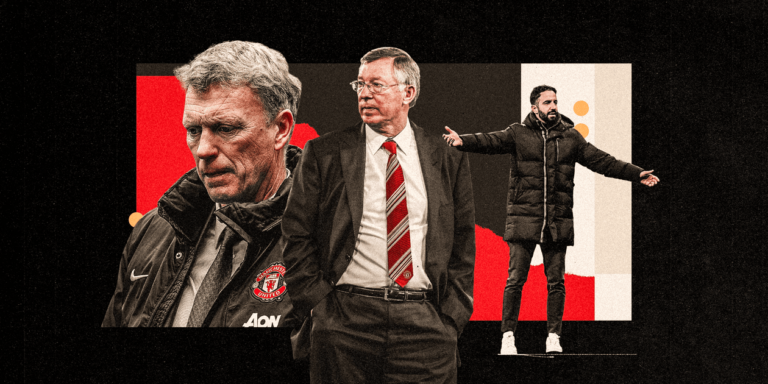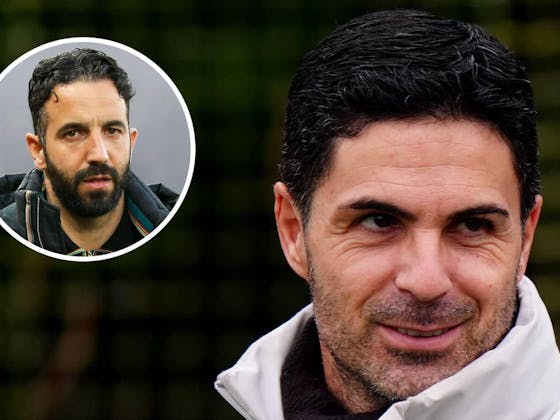
Manchester United, dressing-room leaks and why it’s not a new problem
When Manchester United opened their training ground in Carrington at the turn of the century, Sir Alex Ferguson was fairly open about the fact it had been designed with his input “to keep those f****rs from the media out”.
Manchester City’s big problem when they moved into another part of the same village was that they had a public footpath running beside their training pitches, meaning anyone with a camera could loiter behind the fences in the hope of seeing something newsworthy (Mario Balotelli scrapping with manager Robert Mancini being the case in point).
United did not have a footpath to worry about. There was, however, a tree that photographers could, in theory, climb to get a view over the fences. The tree was chopped down and, before one game, Ferguson issued a direct challenge to the football writers on the Manchester beat: if anyone guessed his team right, he would pay for that person to have a weekend in Loch Lomond – as long as it was a weekend, he added, when the infamous Scottish midges were out.
“The journalists call this place Colditz,” Ferguson liked to boast. “And that’s just the way we like it.”

Sir Alex Ferguson liked to call Manchester United’s training ground ‘Colditz’ due to its lack of leaks (Alex Livesey/Getty Images)
Yet, contrary to what you may have heard over the last few days, the issue with United’s team news being leaked is not purely a post-Ferguson problem.
It happened in his day, too, via a poster on the Red Issue fans’ message board who regularly flagged up United’s starting XI several hours, or even days, earlier than it was meant to be public knowledge.
The difference back then was that the big social media channels were still in their infancy — United, remember, did not have a Twitter account until July 2013 — or did not exist at all. Tweeting, as far as Ferguson was concerned, was something birds did. X, as Twitter is now known, was maybe how you would have rated a late Paul Scholes tackle.
There were none of the fan channels that scrutinise everything these days for huge international audiences and, at some clubs, are allowed into news conferences. So the leaks never went viral as they do now. And if United were aware of Red Issue getting an early shout, they never made a big deal out of it because this was one area, perhaps, in which Ferguson did not move with the times. To him, “the media” meant Fleet Street’s football writers and, for the most part, whatever he had read that morning in the Daily Express, the one newspaper he had delivered to home.
It has never been harder to keep a secret. Hence the familiar pattern of leaked line-ups handing a tactical advantage to whoever United are playing, as witnessed before the Manchester derby last weekend when Ruben Amorim’s team was reported on the Manchester Evening News website the previous night, quickly going viral.
David Moyes was so infuriated by the leaks during his time as United manager that he banned David McDonnell, the Daily Mirror’s long-serving United reporter, from press conferences for revealing United’s starting line-ups on the morning before matches.
On another occasion, Phil Neville, Moyes’ assistant, stormed through the post-match interview area at Aston Villa demanding to know the source of leaks to another media outlet.
Others have taken the view that it is simply a part of modern-day sport and, annoying though it is, the manager has enough on his plate without worrying unduly about something that, as Amorim described it, is “impossible” to police anyway.
Jose Mourinho understood that, too, and even used to make a joke of it at times, playfully redirecting questions about team news — “he knows!” — to Samuel Luckhurst, the Manchester Evening News correspondent.

Jose Mourinho came to expect that his Manchester United sides would be leaked (Ozan Kose/AFP via Getty Images)
Luckhurst, by his own admission, went a shade of beetroot when Mourinho saw him at a media event before Fenerbahce took on United in Turkey last month. “He (Luckhurst) had an incredible talent when I was at Man United,” Mourinho announced to the room. “Every match, he knew the team.”
In newspaper language, this can often lead to back-page headlines about a club or manager launching a “mole hunt” to root out whoever is responsible. But how often do such searches pay off? It is difficult to think of a single footballer in the Premier League era who has been disciplined for such a matter – mostly, because it is not them directly doing it.
Just consider how it works. The players usually know the line-up at least 24 hours in advance because of who is handed first-team bibs in training. Usually, though, the team’s shape for a Saturday fixture is worked on all week. It is the biggest thing for a footballer in any given week: what’s the team?
So, hypothetically, if you are a footballer and have been selected (or not) in the starting XI, it is human nature to discuss it with an agent, a family member, a friend or maybe another member of staff. They, in turn, will inevitably share the news inside their own circle. And on and on it goes.
It happens at every club and, by the time it reaches the internet, the relevant player might not even join the dots and realise he is the source. The leak, in other words, does not have to be malicious. Don’t just assume, as many people do, that it is an out-of-favour player creating problems from within (though don’t entirely rule that out, either). The truth is, it can come from all sorts of places.
Not everyone is willing to accept that, clearly. Last month, Brendan Rodgers, the Celtic manager, revealed in a press conference that he had discovered his team had been leaked before a Scottish League Cup semi-final against Aberdeen.
Celtic won 6-0, but Rodgers’ point was that the leak had given their opponents a tactical advantage. And he made this point by revealing that he had previously benefited from being in the same kind of position.
“In the modern game, there are no real secrets in football,” said Rodgers. “That’s the reality but it’s not nice when it gets out there — especially if it’s from Celtic supporters. It might feel great for someone’s ego to put it out and pass it on to other people, but as a manager I’ve had that before with (opposition) teams.

Brendan Rodgers was unhappy his Celtic team had been leaked (Ian MacNicol/Getty Images)
“When I got to know (the opposition line-up), it really helped my preparation. I’d come up with a plan to play against a team and I’d then be told, the day before the game, that the team was going to play a totally different shape.
“I could stick in an extra (tactics) meeting that night at the hotel to say: ‘This is what we think their team is going to do because we’ve had a message’. And then, lo and behold, we go in the next day and their team is playing that shape and it helped us win the game.
“So whoever is putting it out, if it’s someone from Celtic, you’re not a Celtic supporter because you’re not helping Celtic. If you’re not a Celtic supporter, we will do everything we can to find out.”
One of the more interesting parts of Rodgers diatribe was that he never questioned whether the original leak might have come from one of his players. And that was probably sensible given the impact — in the media and for team spirit — if he had positioned it as an enemy within.
Dennis Wise went down that route during his time as Leeds United manager, announcing after a 2-1 defeat of Crystal Palace in 2007 that his team had been leaked to the opposition and the culprit would never play for the club again.

Dennis Wise was at the centre of a leaking row between Leeds and Crystal Palace in 2007 (Paul Gilham/Getty Images)
Wise’s information was that the opposition manager, Peter Taylor, had been indirectly tipped off by an unnamed Leeds player speaking to one from Palace the previous night. Everything got very messy, especially when Shaun Derry and goalkeeper Graham Stack had to deny internet rumours that they were responsible and Taylor accused Wise of overreacting.
“I had an idea of who would be in the Leeds team at 8pm on Friday night but I had no information about team shape,” Taylor said. “As it was, a couple of players I thought would be in the Leeds team weren’t. Players talk to players, it’s part of life and it’s not malicious. I should think there are 40 similar situations around the country at the weekend.”
That, in a nutshell, is what Amorim meant after United’s 2-1 win at City on Sunday when he was asked about his team selection being made available to Pep Guardiola on Saturday evening. “It is impossible to fix nowadays,” he said. “You have a lot of people in the club — players talk with agents, you can talk with a friend. It is not a good thing but let’s move on… see if they find the next starting XI.”
It is even more complicated nowadays if you recall how Aston Villa’s players were banned from playing Fantasy Premier League in early 2021 due to concerns that their FPL selections had revealed an injury for Jack Grealish.

Jack Grealish’s injury led to his Villa team-mates changing their Fantasy League teams (Neil Hall/AFP via Getty Images)
In a sequence of events that probably tell us a lot about the way the modern football world has shifted, a Twitter account called FPL Insider pointed out that Villa’s Matt Targett, Conor Hourihane and Neil Taylor, as well as two staff members, had transferred Grealish out of their fantasy squads before a match against Leicester City.
Grealish was Villa’s best player at the time and it could mean only one thing: he had to be injured. Full-time score: Villa 1 Leicester 2. “If it’s coming out of our training ground, I will find out where that’s coming from and reprimand where it’s coming from,” said Dean Smith, then the Villa manager. “It’s something I wouldn’t be happy with and we’ll get to the bottom of it.”

The internet can be an unforgiving place sometimes. At another Premier League club, the captain was routinely named online as the source of team leaks. It was never true, but what started as rumour eventually hardened into fact in some people’s eyes — and it was held against the player on many occasions. In the end, he went to the club to ask what could be done. And the answer, sadly for him, was very little.
With United, however, there is no doubt they are one of the leakier clubs in England’s top division and that must grate when, in a different era, it was their cross-city rivals who were plagued by what one ex-City manager, Frank Clark, described as “a fifth column on the fringes”.
United, incidentally, have branded as “rubbish” the internet allegations that some of the leaks stem from Alejandro Garnacho’s brother, Roberto, another one who has been singled out by various X accounts for the pitchfork treatment.
Ole Gunnar Solskjaer, another former United manager, has talked about his own frustrations that so many dressing-room secrets were betrayed, telling the Stick to Football podcast there were “one or two in a squad that leaked things because they were unhappy”.
As for Amorim, he was asked a follow-up question at his latest news conference about whether he had changed anything to avoid more leaks ahead of the Carabao Cup quarter-final at Tottenham Hotspur.

Ruben Amorim with Alejandro Garnacho, whose brother has been accused of leaking Manchester United teams – a claim rubbished by the club (Stephen Pond/Getty Images)
“Nothing,” he replied, making the point that Spurs would know his favoured system anyway. “I’m not really worried about that. I cannot control that, so I will do the same things and prepare the same way. It’s more important for my players to go to a game with a clear idea than try to hide something to protect the leaking of the starting XI.”
Very wise, too. It happens, it’s unshakeable and, if you are the manager of a club the size of United, there isn’t a great deal that can be done about it. Colditz? Not any more, Fergie. It is the new norm (just not that new) and, as Amorim says, there is not a great deal of choice other than to get on with it.
(Top photos, from left: David Moyes, Sir Alex Ferguson and Ruben Amorim; Getty Images; design: Dan Goldfarb)





